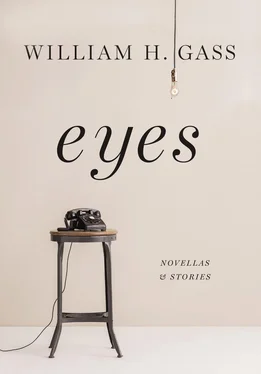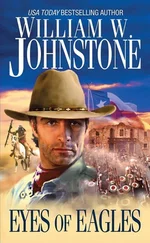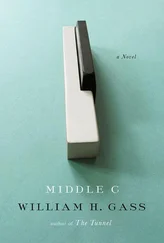Mr. Gab had treasured his collection. However acquired. He had gathered good things together that had perhaps been stolen and dispersed once already. He had achieved an Archive, made his own museum in the midst of a maelstrom. Didn’t that count? So Mr. Stu thought maybe Mr. Gab could say he hadn’t known they were anyone’s legitimate possessions any longer, but were the spoils of war, refugees of slavery, expropriation, and murder. Of course they could be returned to their proper homes if they had any, as long as it was their real wish to be rehung on the dour walls of grandiose old estates with their long cold halls given over to stuffily conventional family portraits and other tasteless bragging, to languish in the huge mansions or palaces they’d come from, or to sit in shame propped up on some lectern like a speech no one would give and no one would wish to hear; that would be okay, provided there’d be no further punishment for Mr. Gab, since he’d had pain enough from his loss to surpass that of most lovers. Lover: that was right, because who, Mr. Stu surmised, had looked at them as though they were gray lace, who had weighed a shadow against a substance, a dark line against a pale space, the curvature of a street’s recession against the forefrontal block of a building, so as to feel the quality of judgment in every placement, the rightness of every relation, and how these subtle measures made the picture dance with the ideal gaiety of an ideal life.
We pass through frames, Mr. Gab had said. We walk about our rooms, our house, the neighborhood, and our elbow enters into a divine connection with a bus bench or bubbler in the park, a finial, a chair or letter lying on a hall table, which is, in an instant — click — dissolved. The nose, the earlobe, the bosom, the elbow, the footfall, the torso’s shadow pass in and out of awkward — in and out of awful — in and out of awesome combinations just as easily as air moves; the sublime, the suddenly supremely meaningful and redemptive moment is reached, achieved, left, dissolved into the dingy, only, in a few frames further, to connive at more communities. It is grace and disgrace constantly created and destroyed. The right click demonstrates how, in an instant, we, or our burro, or our shovel, or our eye or nose or nipple, were notes in a majestic symphony. A world of self-concerned things is suddenly singing a selfless concerned song: that was what the fine photographer, over and over, allowed to be seen in solemn apology for what should have been heard .
Nothing had been heard from Mr. Gab in quite a while, though Mr. Stu hadn’t counted breaths; however his employer’s retreat should not have been surprising since he’d just lost a wife, more dear than life, to a bunch of hand trolleys. He’d been in the dark on his garret cot sobbing like a sad child, Mr. Stu bet, why not? In a room fixed to the top of a shabby ladder like a squirrel’s nest in a tree; what could be sillier than where it was? and Mr. Stu had wanted to laugh when he first saw the way the ladder led up through a hole from which coal could once have dropped. Perhaps Mr. Gab could be comforted by the darkness since it might suggest an end to things — no more moving men moving his treasures out, treasures to be treated like contraband — less anxiety, fewer humiliations — dark at midday was what this day deserved — so perhaps he’d been somewhat slightly — well, not reassured — but protected from any additional pain, such as being pierced through and through by his unwarranted suspicion of his former employee, Mr. Stu, a feeling that had been turned on — click — like a light, when the strange man had said the phrase — the curdling phrase—“informed upon.”
You have been given up, Mr. Gab. We gotcha. Dead to rights. We got yer goods too. Yer a looter, a despoiler, a thief, a fence, a flown-away father, an ungrateful and suspicious boss. Now you’ll have to bear your loss like just desserts. Go to bed like your boy has, time upon time, to cry inside the pillow till the pillow flats. Go to bed like your boy has, countlessly, to imagine the bitter oncoming day. When you will walk about a barren store. When you will begin to miss me. When you’ll be invited to “come downtown.” Go to bed like your boy has, heart beaten by shame, sore and in despair he is alive. Go to bed like your boy has, angry at all, alone as a bone that has lost its dog. Head screams aren’t effective. Head howls aren’t effective. Headlongs aren’t worth a damn. Seek some solace in the fact that you aren’t being gnawed on at the moment, not being yelled at, at the moment, not being guffaw’d, not being always, at anything, the worst, to be the basket into which everything is eventually tossed. Seek solace we advise…seek solace, don’t we say? The one photograph that remains, had it been unshrouded and claimed, would nonetheless have been engraved on your weeping eyes.
Mr. Stu felt a wadded sheet at his uneven feet. He picked it up, to unwrap and refold, only to find his arms weren’t long enough, so he spread it out on a trestle where bright slivers of sunshine from the shutters fell in lively white streaks. Mr. Stu drew a roll of masking tape from Mr. Gab’s desk drawer, tape Mr. Gab used now and then to repair boxes, and began to block out the light, initially not easy because it bled through the thin tape, and it took several layers to make the glow even faint. By biting the tape into thin strips and making its stickum cling, Mr. Stu gradually darkened the room. Now there was only a halo to see by. It ran around the rug and apparently came from a light in the kitchen. Bring a pin, Mr. Gab, please, Mr. Stu called out. Though he thought he heard in his head the beating of a desperate heart, Mr. Stu boldly drew back the rug and entered the kitchen where he found, after a few minutes of pawing about in drawers which otherwise yielded little in the way of contents, a roll of stout picture wire. Bring a pin, Mr. Gab, please, Mr. Stu shouted up the ladder at the hole that was even darker than the inside of a hose.
Mr. Stu was feeling his way to his idea. He realized, while groping between trestles, that he was performing the steps of his project in the wrong order. Consequently it was with difficulty that he found the nails he wanted on opposing walls, and with difficulty that he finally fastened one end of his wire to a conveniently big nail, and with difficulty that he unrolled the wire — held over his head — to the other side and found another roofer to wind his wire around, allowing the remainder of the roll to dangle. Now he had a firm line across the room to fling the sheet over, but he was unsure of what came next. Bring a pin, please, Mr. Gab, he called, suddenly weary and useless.
It took some time — and after the slow return of resolution — to hang the sheet, though he should have been more expert, having hung a lot of laundry out to dry in his day, even standing on a short stool to do his pinning when the line was beyond his reach. He stared into the dark, making nothing out. What’s the idea, Mr. Gab asked. They stood in pitch now that Mr. Gab had turned the kitchen light off. I just thought we might—. Mr. Stu began. Ah, of course, you’ve occluded the shutters. Tape, Mr. Stu said. Something to do. You might have thought I was crying, Mr. Gab said. I was not. I was at a loss even for that. I didn’t, Mr. Stu said, think. You might have thought I was huddling, Mr. Gab said. I was not. I was too tired to lie down. I didn’t, Mr. Stu said. There is nothing for my eyes to adjust to, Mr. Gab said. It’s as dark as the hole in a hose, said Mr. Stu.
They both stood without the whereabouts of the other. Say something more so I’ll know where you are, said Mr. Gab, clearing his throat as if he were warning a boat about a shoal. I thought if we pinholed a bit of the tape, we’d get here, on this sheet you can’t see, a bit of picture. Something to do, said Mr. Stu. Mr. Gab bumped gratefully into his desk. Mr. Stu heard its drawer being withdrawn. I’ve a hatpin here somewhere. Rats — ouch. No. I didn’t stick myself, just thought I might have. Mr. Gab had to get close up because the tape on the shutters was barely visible even close up. If I were to put a hole, say, here — what—
Читать дальше












